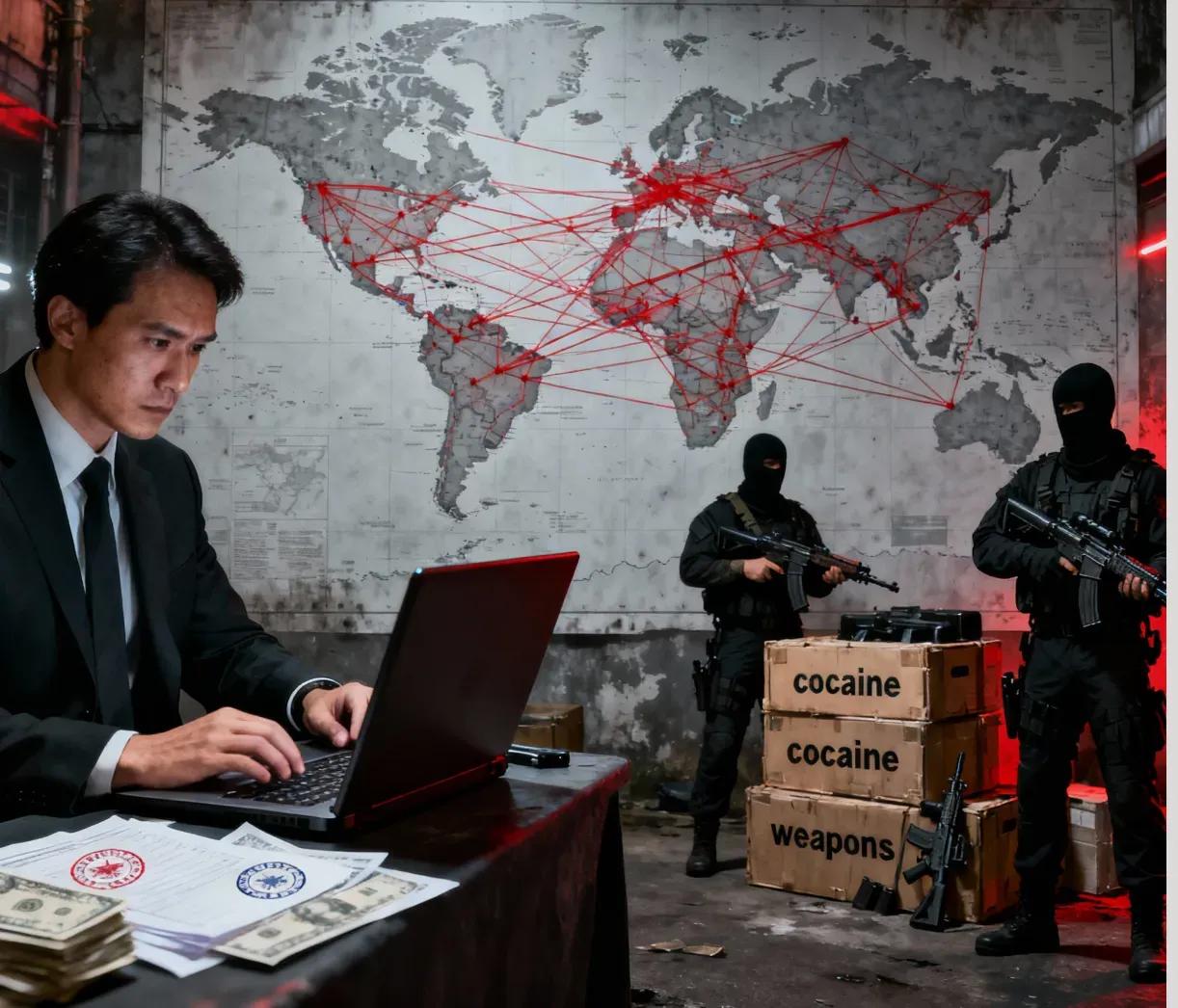William Acosta, CEO of Equalizer Investigations for FinGurú
Brazil is undergoing an unprecedented stage in its criminal and financial history. The Primeiro Comando da Capital (PCC), Comando Vermelho (CV), and Organização Criminosa Comando (OCC) have ceased to be prison gangs and become authentic transnational conglomerates, mixing drug trafficking, illegal mining, deforestation, and sophisticated money laundering.
These factions not only dominate the trafficking of cocaine, gold, and timber but have created alliances with international terrorist networks such as Hezbollah and Hamas, and have managed to infiltrate formal and political sectors in Brazil and other continents.
Today, their tentacles reach Africa, Europe, and the Middle East, using a network of shell companies, digital banks, cryptocurrencies, and public contracts to move more than 35 billion dollars a year.
Hierarchical Structure and Leadership
Primeiro Comando da Capital (PCC)
Marcos Willians “Marcola” Camacho: Supreme leader and strategic mind with power throughout South America.
Marcos Roberto “Tuta” de Almeida: Global operative and responsible for African and European routes.
Michael “Neymar do PCC” Silva: Internal discipline, human resources, and control of cryptocurrency transactions.
Roberto Augusto “Beto Louco” da Silva: Economic-legal operations and in charge of energy contracts.
Mohamad Hussein “Primo” Mourad: Business bridge with the Middle East, energy and oil sector.
Roberto Soriano “Tiriça” and Daniel “Cego” Canônico: Regional leaders in Amazonian and river logistics.
Valdeci “Colorido” dos Santos and Abel “Vida Loka” Pacheco: Oversee operations in Bahia, Ceará, and Paraná.
Comando Vermelho (CV)
Luiz Fernando “Beira-Mar” da Costa: Founder and doctrinal force.
Márcio “Marcinho VP” Nepomuceno: Political and penitentiary operator.
Wilton “Abelha” Quintanilha: National logistics.
Clemilson “Tio Patinhas” Farias: Amazon management and links with the Bolivian east.
Edgar “Doca” de Andrade: International alliance Lima–Santa Cruz–Ciudad del Este.
Luciano “Pezão” Martiniano, Flávio “Fatoka” Monteiro: Territory control in the northeast and favelas of Rio.
Isaias “Borel” do Nascimento and Johnny “Bravo” Viana: Leaders in Rio.
Key Shell Companies
Nova Paraíba Import S.A., Sólido Logística Ltda., Cabedelo Investimentos, and Ariadna Comércio e Construções.
Organização Criminosa Comando (OCC)
Paulo “Sombra” Dias: River general.
Everaldo “Capixaba” Mendes: Mining and illegal extraction.
Lucivaldo “Anaconda” Figueira: Head of transportation and security.
Shell companies: OCC Empreendimentos e Construções, OCC Engenharia Ltda., OCC Comercial Importadora Ltda.
Successive Operations, Judicial Processes and Criminal Impact.
They hide millions through public contracts, false imports, and infrastructure works in Bahia, Pará and Rio.
Money laundering networks involving trust funds and motels (Estrella Motéis & Hospitality Group, Trustee DTVM, Rede Futuro Fintech S.A., Zurich Multi-Strategy Investment Fund).
The largest and most significant processes include:
Operation Hidden Carbon / Carbono Oculto (0012456-92.2025.8.26.0050): dismantled the largest tax evasion structure with 7.6 billion USD and over 10,000 related gas stations.
Operation Crime Refinery (0027814-45.2024.8.26.0050): seizure of 4.1 billion USD in energy.
Custos Fidelis (0004856-31.2025.8.13.0046): mass arrests and blocking 223 million USD.
Asphyxia (0003972-59.2025.8.19.0001): direct links with Military Police and lawmakers.
Aegis (0002346-60.2024.8.13.0028): sentences of up to 32 years and confiscation of assets worth 35 million USD.
Hercules X (0007831-64.2025.8.13.0178): eradication of clandestine courts.
The violence figures are devastating: 2,300 documented direct homicides in the last decade, 40,000 indirect deaths due to territorial control.
Areas of Operation and International Reach
In Brazil: São Paulo, Bahia, Mato Grosso, Goiás, Rio de Janeiro, Amazonas, Pará, Acre, Ceará.
International: Presence in Paraguay, Bolivia, Venezuela, Peru, Colombia, Chile, Argentina, Portugal, Spain, Belgium, Italy, Netherlands, Nigeria, Ghana, Guinea-Bissau, Mozambique, Angola, Lebanon, Iran, and Turkey.
Contacts with Mafias: African (Abdulaziz Okoro, Nigeria; Ibrahim Touré, Guinea-Bissau) and operators from Mozambique (Carlos Benjamim Mavota), as well as Chinese businessmen from Hong Kong and Shenzhen to channel funds in cryptocurrencies and e-commerce.
International Allies and External Financing
Contacts with Hezbollah: Assad Ahmad Barakat, Diab Kachmar, Akram Kachmar and Sobhi Fayad, money laundering masters in the Triple Frontier and Lebanon.
With Hamas: Iranian-Venezuelan businessmen of the Cartel de los Soles and smugglers moving Amazonian gold.
Documented Alliances with: ELN, Nueva Marquetalia, Tren de Aragua, and African networks of Nigeria and Guinea.
Relations with China: Shadow banking in São Paulo and sending assets to Asia and Africa, connected to networks of technology and illegal mining.
The criminal economy moves: 900 tons of cocaine (15 billion USD), gold (8 billion USD), timber and minerals (2.5 billion USD), laundering and fuels (9.5 billion USD), weapons (250 million USD).
Conclusion
The PCC, CV, and OCC shape the most dangerous fabric of global organized crime, mixing armed brutality with business management. They have overflowed Brazil's borders with solid alliances in Africa, the Middle East, Europe, and with major Latin American cartels. As long as there is no multinational response that combines intelligence, banking operations, and diplomatic action, the Brazilian threat will not only persist but will expand the model of narco-government to the rest of Latin America and the democratic world.
About the Author:
William L. Acosta is a graduate of PWU and Alliance University. He is a retired police officer from the New York Police Department, as well as founder and CEO of Equalizer Private Investigations & Security Services Inc., a licensed agency in New York and Florida with international projection.
Since 1999, he has led investigations in cases of narcotics, homicides, and missing persons, in addition to participating in criminal defense at both state and federal levels. A specialist in international and multijurisdictional cases, he has coordinated operations in North America, Europe, and Latin America.

Comments